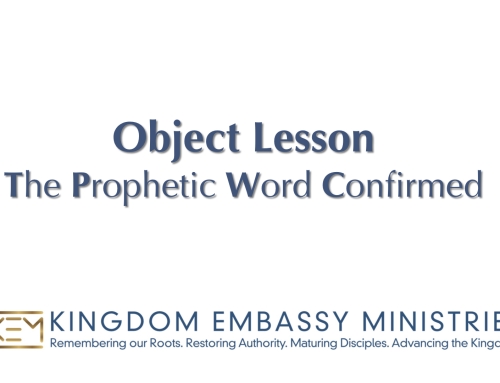Weekly Scriptures | Sermon Notes | Sermon Video
 The Father has been in the business of separating things from the beginning. He separated light from darkness; water in the firmament above from water below; and then water on the earth from the land. When creation was finished, He separated the six days of creation from the seventh; then He rested and blessed the seventh day and sanctified it—called it holy.
The Father has been in the business of separating things from the beginning. He separated light from darkness; water in the firmament above from water below; and then water on the earth from the land. When creation was finished, He separated the six days of creation from the seventh; then He rested and blessed the seventh day and sanctified it—called it holy.
Paul has been emphasizing this doctrine of separation in what should now be obvious. Chiefly we know this; there are two Israels with two different inheritances, both good, but only one is holy; that’s the separation. There is also a third people group whose inheritance is not good, and again we see a separation, this time the bad from the two that are good. So, we count three eternal people groups.
Might we use the crosses of Calvary to depict the three? To help, create a picture in your mind—see them atop Golgotha. There is a man in the middle and a criminal on each side. The imagery is striking; there are three crosses on Calvary: the redeemed man, the perfect man, and the rebellious man. One will be a citizen into eternity, one a ruler, and the last a rebel. So, again we count three eternal people groups.
Allegorically, these three crosses require two gospels, the gospel of salvation and the gospel of the kingdom. The gospel of salvation moves a man from the cross of rebellion to the cross of redemption; the gospel of the kingdom moves a man from the cross of redemption to the cross of perfection. One man will believe that only his salvation matters and, as such, the gospel of salvation is all that is important. One man will recognize his role in bringing the kingdom of heaven to earth, and thus he will also include the gospel of the kingdom in his repertoire. One man will remain rebellious and believe neither. Which one represents you; which is your ultimate inheritance? Once more we count three eternal people groups.
Paul has already made a distinction between the citizens and the rulers; between Israel and Israel, and allegorically between redemption and perfection. One will inherit the earth, the other heaven. And those who inherit neither will inherit eternal flames. Let’s disregard that third group here because they just don’t care about this topic. They need not come to any civil agreements with the two groups that are good; it is really between the good and the holy that we might feel contention.
The Father has been in the business of separating things from the beginning and everyone has a role to play. But here, Paul is about to set the record straight once and for all. God has a plan to bring some of the natural branches of Israel together with the heavenly branches of Israel as one new man, and He is showing us what that will look like. Who ultimately plays on which team will not be completed until the very end. “If the fall of natural Israel is riches for the world, and their failure riches for the Gentiles, how much more their fullness!” What does it all mean and how can you file away these confusing thoughts in such a way that you understand who you are to God and what role you will play in God’s eternal plan? Let’s find out!


Leave A Comment